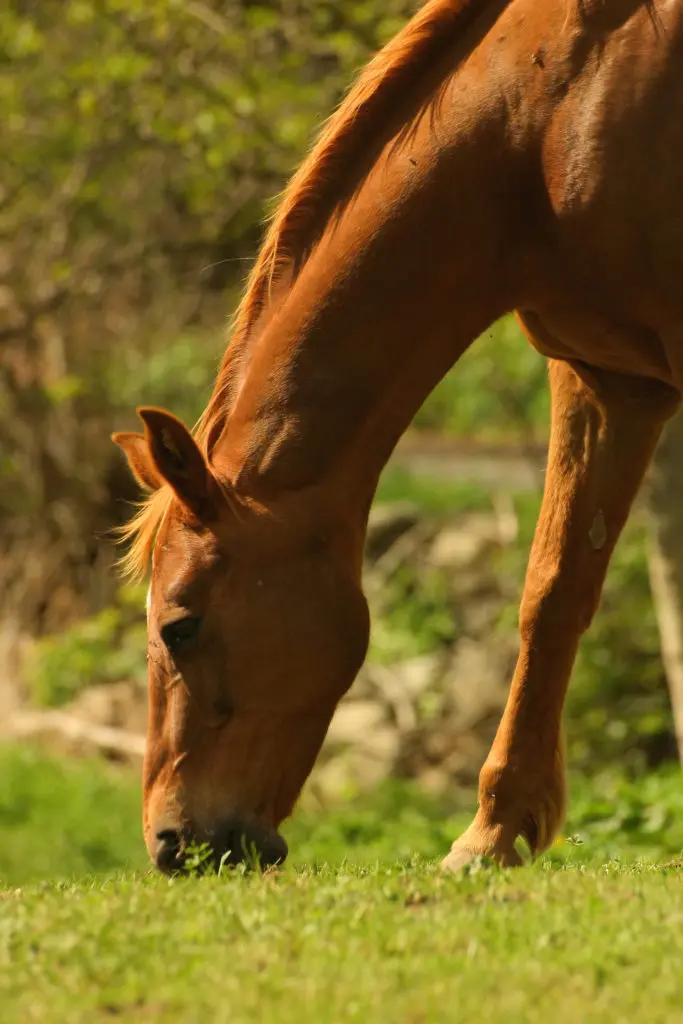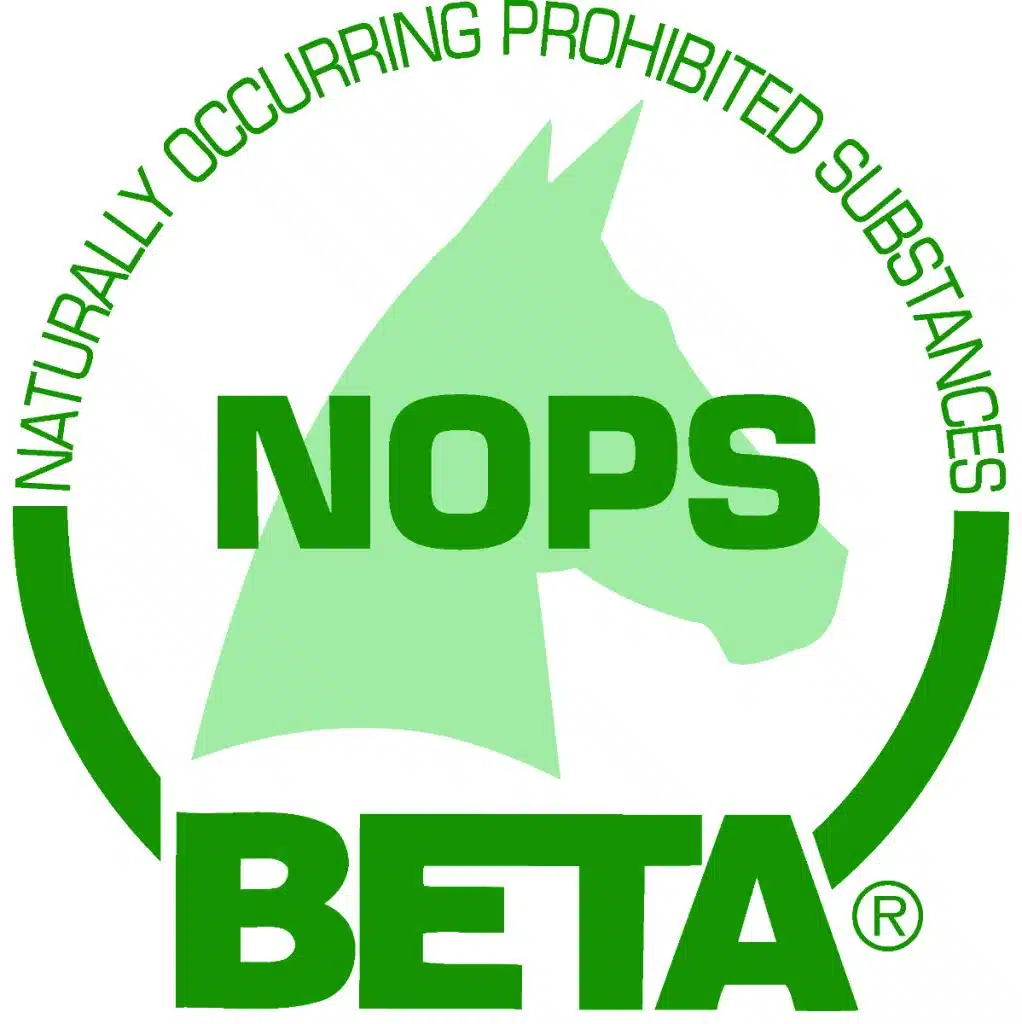Obesity in horses is a growing problem, which can have major implications for your horse’s health just as it can impact on our own health if we gain too much weight. Therefore, as we enter spring it is a good time to evaluate your horse’s bodyweight and consider if they may need to shed a few pounds because this is the time of year we usually see horses gain more weight due to the increase in grass growth.
In the wild, horses gain weight during the spring and summer months to prepare for when access to food is more limited during the autumn and winter when they lose weight. However, in the domestic horse these times of natural weight gain and loss that balances out over the year doesn’t exist because we feed our horses well year-round, which can mean that they enter spring already slightly overweight. The types of feedstuffs that we feed can also add to the issue, with higher calorie feeds meaning that more calories can be consumed in a smaller amount. I’m sure we’re all aware of that tasty chocolate bar that contains very high amounts of calories compared to the equivalent weight of bran flakes.
Exercise is another aspect that needs to be considered, in that feral horses will roam for miles each day searching for food, whereas domestic horses are generally confined to a much smaller area of better quality land/pasture. Many horses are also confined to stables for periods of time, which also reduces the amount of exercise they get. Furthermore, because we know that we need to make sure our horses have plenty of forage to eat to prevent them from becoming bored in the stable, we often provide ad lib hay, which coupled with low levels of exercise can contribute to weight gain.
All types and breeds of horses can be affected by being overweight; however, native breeds tend to be more susceptible to weight gain. An overweight horse or pony is more likely to encounter health issues; such as digestive disorders, metabolic disorders, laminitis, endocrine disorders, respiratory problems, joint strain, heart and circulatory problems. Overweight horses also tend to be more lethargic and consequently have lower performance. Therefore, it is important to ensure that your horse’s weight is managed appropriately.
As horse owners, we usually know if our horses tend to put on weight easily and if that’s the case, then they are described as a “good doer”. As a rule of thumb, it is advisable to prevent weight gain in these types of horses rather than having to put them on a diet later on. The following information is provided as a guide in preventing weight gain as well as advice on the best way to manage weight loss if your horse is overweight. However, it is important to note that weight gain can be affected by certain medical conditions and therefore if your horse is overweight it is advisable to consult your veterinary surgeon for advice before beginning any form of weight management programme.
Assessing your horse's body weight and condition
Before any nutritional intervention can take place, an assessment of your horse’s body weight and body condition needs to be done. This will allow you to calculate the amount of feed your horse requires and to determine if your horse needs to gain or lose weight. Regular assessment of body weight and body condition will also enable you to determine how much weight your horse has gained or lost over a certain period of time.
There are a few different ways that you can assess your horse’s weight. You can use a weigh bridge, but not everyone has access to one of these. Alternatively, you can use a weigh tape, which you can purchase from your local tack shop or feed merchant. It is important to measure your horse’s weight regularly and record this to allow you to monitor their weight. In addition to determining your horse’s weight, you also need to look at their body condition, which can be done using body condition scoring (BCS).
Many vets and nutritionists use a body condition scoring system called the Henneke Body Condition Scoring system, which uses a scale of one to nine to help them determine if a horse is of an appropriate condition or not. As a guide to assessing if your horse is overweight, a good place to start is the ribs. If the ribs can only be felt by pressing hard, or cannot be felt at all, then your horse is likely to be overweight. You can then look at the middle of the back, if the spinal processes cannot be felt and there is a noticeable crease down the back, then that will indicate that your horse is overweight. You can then look for fat deposits along the neck, rump and tailhead. Lumpy fatty tissue in these areas is of concern as they are an indication of obesity and an indicator of risk for obesity-related diseases, such as metabolic syndrome and laminitis.
Feeding horses that are prone to becoming overweight
Now that we have discussed how to assess your horse’s weight, we can consider how to deal with the situation of managing your horse’s weight.
Horses gain weight because they take in excess calories above the amount required for their daily metabolism and energy expenditure during exercise. Therefore, the goal of managing weight is to balance energy intake with energy expenditure. The following is a guide on ways in which you can manage your horse’s weight.
- Evaluate your horse’s diet in consultation with your veterinary surgeon or nutritionist
- Commit to managing your horse’s weight over the longer term
- Base your horse’s diet on forage and/or fibre
- Make dietary changes gradually and avoid prolonged periods of fasting
- Minimise high calorie feedstuffs in the diet (e.g. cereal grains and oil)
- No excessive feeding of treats (e.g. carrots, apples etc)
- Ensure adequate exercise
- Be realistic about workload and feed according to how much work your horse is doing (most people over-estimate how much work their horse is doing)
- Feed your horse as an individual
Feeding horses that need to lose weight
The basic principle of weight loss is “eat less” and “exercise more”; however, I am sure that many of us know that it is easy to say this, but it can be difficult to put into practice. What we have to remember is that it is us, as horse owners, that need to make the changes required to promote weight loss in our animals. Therefore, we need to evaluate how we are currently managing our horses and consider what changes we can make to enable them to lose weight. The following is a guide to how weight loss can be managed (these are in addition to those points given above).
- After assessing your horse’s body weight and BCS, set realistic goals for target weight loss, in consultation with your veterinary surgeon or nutritionist.
- Commit to a long-term weight management programme.
- Make any dietary changes gradually, including reductions in the amount of feed offered. Health problems can occur when horses are suddenly fed severely restricted diets.
- Remove all high calorie feedstuffs from the diet (e.g. cereal grains and oil)
- Increase the amount of exercise your horse is doing (if appropriate), weight loss is more effective by combining feed restriction with increased exercise.
- Feed at 2 percent of bodyweight for the first two months of the programme (for example, 6 kg per day for a 300 kg pony)
- If your horse is not doing any exercise then this must be introduced gradually to avoid injury, especially in overweight horses as they are more prone to fatigue and injury as they are carrying excess weight. You may begin with walking in-hand twice daily for the first week and gradually increase to 30 minutes of exercise daily over a number of weeks.
- If your horse is unable to be exercised (for example in the case of chronic lameness), you could turn out into a larger paddock or turning out with a companion to try to increase the amount of voluntary exercise your horse does. However, check with your veterinarian on this.
- Once the level of exercise has been increased, feed restriction can be reduced.
- If after 2 months your horse still needs to lose more weight, then you can reduce feed intake to 1.5 percent of bodyweight for a further 2 months (for example, 4.5 kg per day for a 300 kg pony).
- For restricted feed intakes divide the forage ration into 3 to 4 feeds per day.
- Prolong feeding time by using haynets with small holes.
- If you do need to restrict your horse’s intake to 1.5% bodyweight it is important that you do so after consultation with your veterinarian.
- Restrict access to lush pasture (see below for advice on managing turnout)
Turnout Advice
Unlimited access to grazing during the growing season can lead to weight gain as pastures are typically high in sugars during this time. Therefore, whilst allowing horses access to pasture is good management practice as it promotes exercise, reduces boredom and promotes social contact with other horses, this must be limited in order to reduce the intake of grass in those horses that are overweight or prone to weight gain, or have a history of laminitis. If you horse falls into any of those categories then the following advice is recommended:
- Avoid or restrict turnout at the times of year when sugar levels in the grass are likely to be highest (spring and autumn).
- If you do turnout, then do so at times when sugar levels are likely to be lowest (late night to early morning)
- Provide forage when your horse is not turned out
- Restrict turnout to small, well managed paddocks
- Do not graze on pastures that have not been properly managed by regular grazing or cutting. (young leafy swards contain less sugars than mature stemmy grasses)
- Ensure pastures are free from toxic plants (hungry animals are more likely to eat them)
- Consider using a strip grazing strategy, where paddocks are divided into smaller areas in order to limit grass intake
- Consider turnout in an indoor or outdoor school with forage provision
- Consider the use of grazing muzzles (ensure horse can drink enough and be aware of possible behavioural issues)
Article written for Premier Performance by Professor Jo-Anne Murray.








